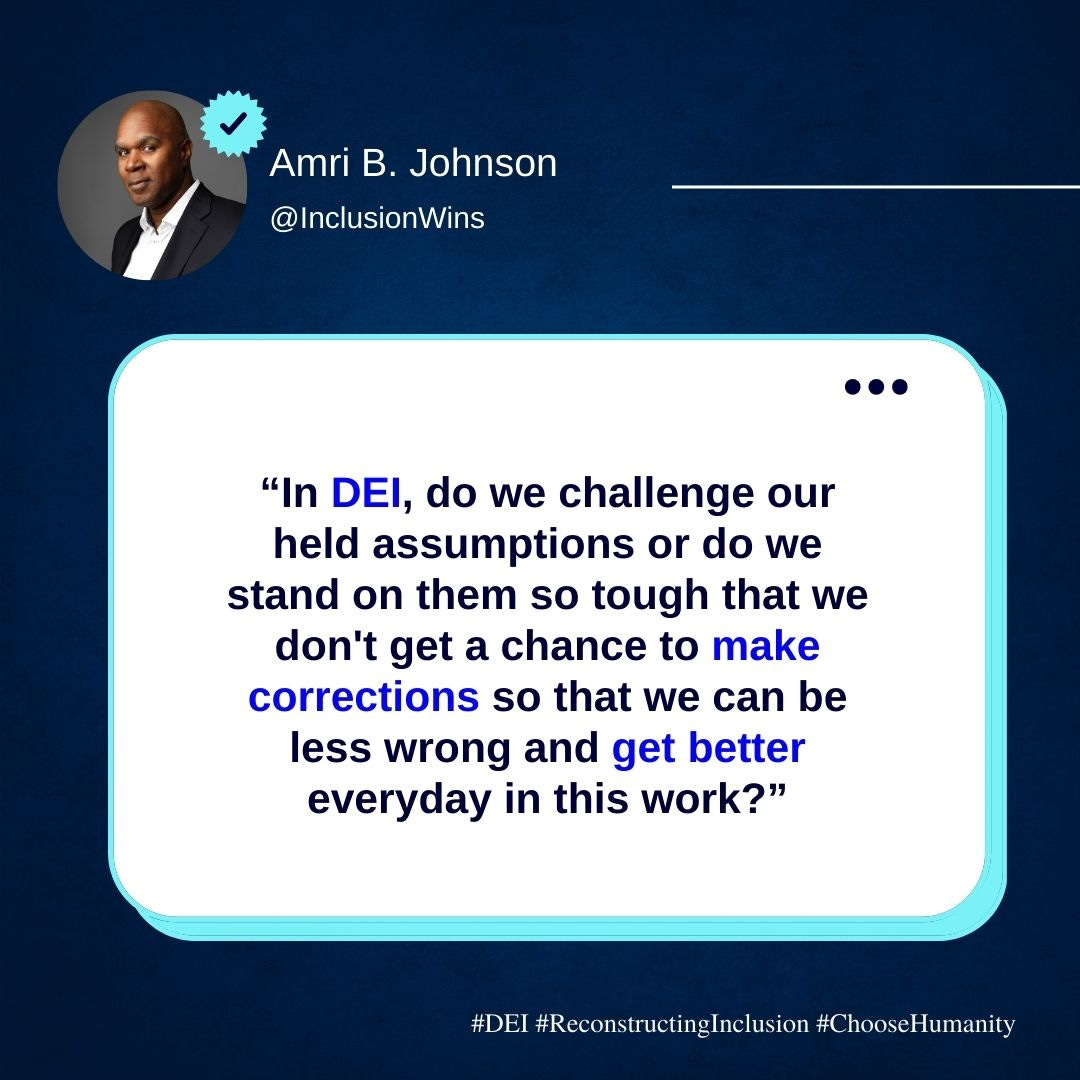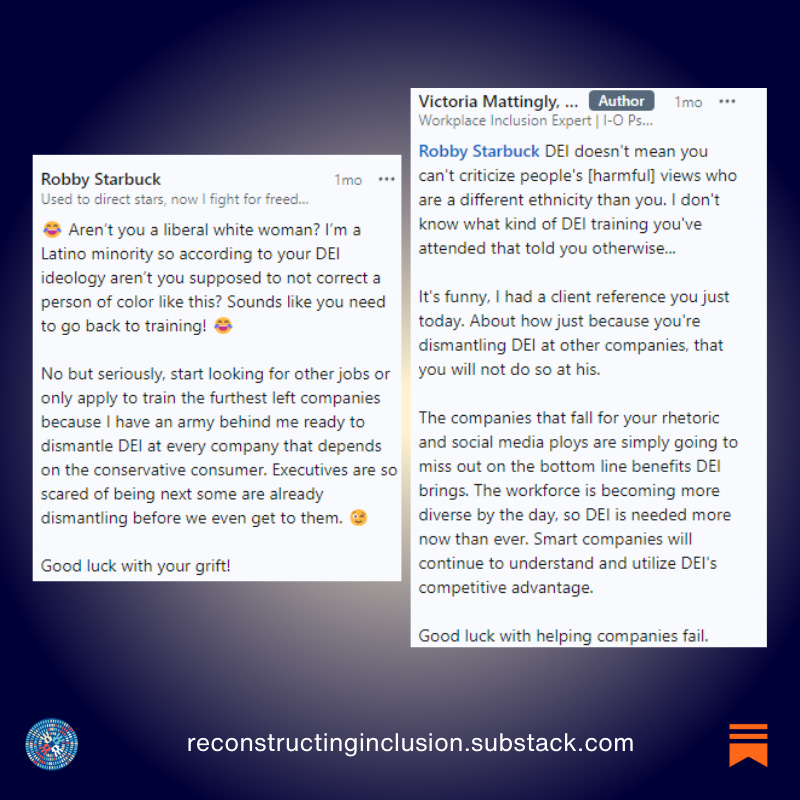The Three Mistakes DEI Advocates Make (And How to Avoid Them)
A word of advice for DEI practitioners and supporters: STOP reacting to silly, politically motivated actors who claim to be anti-DEI.

I use the word “actors” deliberately. They are acting out a role that they feel can benefit them. In this role, their true goal is not to get rid of anything. It seems like this is the case, but what they are against has nothing to do with their main objective.
Rather, they aim to be known as someone fighting against something. Usually, this is a grievance that people in their in-group (or the group they aspire to have high status within) will get behind and reward with attention, money, fame, you name it.
They are writing the play on the go. All dramas require an antagonist to their protagonist/hero. And, if you are the “Anti-DEI Guy,” who better to be your protagonist than the “Pro-DEI Practitioner?” It is better if many of “them” are working to refute your rhetoric with fist fulls of confirmation-bias-inspired data, logical explanation, and quasi-equanimous tone.
I have looked through a few articles reacting to the latest DEI pushback. That is, the latest to hit the news cycle. Most people start by defending DEI. This is the first mistake.
Messaging (articles, blogs, social media posts, etc.) defending DEI goes like this:
1) “DEI is good.”
2) “DEI is really good because. . .McKinsey and other BigCons said so, etc.”
3) “DEI is super good, and I have evidence that it is so. Because it is not just about [fill in the blank with an identity that you work with or something your DEI-related business does well].”
I appreciate the sentiment of this and other articles. The author of the article linked above is someone I have followed and occasionally engaged with over the past several years.
And, to give attention-seeking anti-DEI rhetoric, like that being perpetuated by the guy with the name like the coffee brand (and that makes me think of the Hall of Fame Dallas Cowboys’ quarterback), is not advancing DEI.
It is doing much more to make his personal star shine (see what I did there, Cowboys fans). (BTW: I greatly respect Roger the Dodger, ‘Hail Mary’ pass coiner, stand-up human being, Staubach. I am in no way equating him with the so-called “DEI is poison” guy vying for his 15 minutes of fame).
This brings me to the second mistake among DEI folks in righteous resistance to those who are so-called anti-DEI: citing anecdotes about DEI working without discussing what is not working as well.
Here’s the reality: a significant amount of what practitioners are doing in DEI is not getting the sustainable results organizations need and, hopefully, desire to see.
If you cannot move from anchoring on what confirms your stance and constantly shunning disconfirming evidence, making an extraordinary contribution in this space is hard.
This doesn’t mean that intention or actions were bad or wrong. It does mean that if something is not moving an organization closer to creating the conditions for people to thrive and for the organization to fulfill its mission, a change of approach is necessary.
This latest DEI attack dog is putting defensive practitioners on their heels. Another practitioner followed the similar “Good DEI 1, 2, 3 script” as described above. But in this case, she tagged the attack dog. It was likely one of his best bones of the day. He ripped through it and basked in the recognition.
Again, I am not advocating against people expressing their passions. The author of the above post, who I follow, is actively building her business and is committed to the greater good. What’s challenging about her tactics in this article is that she doesn’t create space for the claims the opponents of DEI are making.
The reality is that their claims are relatively lite and primarily full of rhetoric and talking points of the most well-known conservative bloggers, pundits, and politicians.
Some of what is being said negatively about DEI is reasonable criticism. As practitioners who want DEI to be accessible to everyone, actionable (unambiguously prioritized), and aligned (with organizational purpose so that it is sustainable), we would be blind if we didn’t listen to the arguments, even in disagreement. We aren’t listening, at least not openly so.
The third mistake is immediately defending DEI without understanding and perhaps even reinforcing the position of the so-called other as a good debater would.
Rather than reacting with a contentious stance, it's time to take a different approach. Let's start by understanding the motives behind the pushback. This is the first step towards a more effective response.
From there, where this newest actor (who at one time was a movie director but now obviously wants to be the leading man of his and other’s films) is concerned:
Why is he the one who has taken this on?
Is it really him driving this or is he simply claiming that he is the architect?
Why would a powerful board of directors or executive team of a big firm (like Ford (with a woman CEO), Lowe’s (a black CEO), and others) want to do something that potentially harms their culture?
The answer to all these questions is “not because of a single anti-DEI activist.”
I don’t care how many in his “army of people” that are pushing back on DEI. If there is not a powerful someone inside of a company who wants to occlude DEI for political gain, it would not happen.
The pushback to DEI is a tremendous opportunity. Resisting the pushback only adds to its momentum. It is more advantageous to use the principles of Brasilian Jiu-jitsu. I have no expertise in the fighting style, but I am a fan and admire the depth of the masters and those seeking mastery.
If DEI practitioners apply principles like redirection, breaking the balance, and sacrifice to their work inside organizations, the changes you will see will allow DEI to grow more antifragile than ever.
In conclusion, be mindful of distractions. They come in many forms, usually via a personality that has captured the moment's zeitgeist. The probability that this personality will capture the next moment’s mood is slight to non-significant.
As Chuck D. from Public Enemy said, “Don’t believe the hype; it’s a sequel.”
I hope this was helpful. . . Make it a great day! ✌🏿
In this episode of the ‘Reconstructing Inclusion’ podcast, we talk about developments in Diversity, Equity, and Inclusion (DEI) primarily focused on the U.S. context but with global relevance, and the importance of meaningful dialogue and systemic change within organizations, keeping in mind that effective DEI work involves engaging with diverse perspectives, and should focus on substantive impact and advancing the mission.







